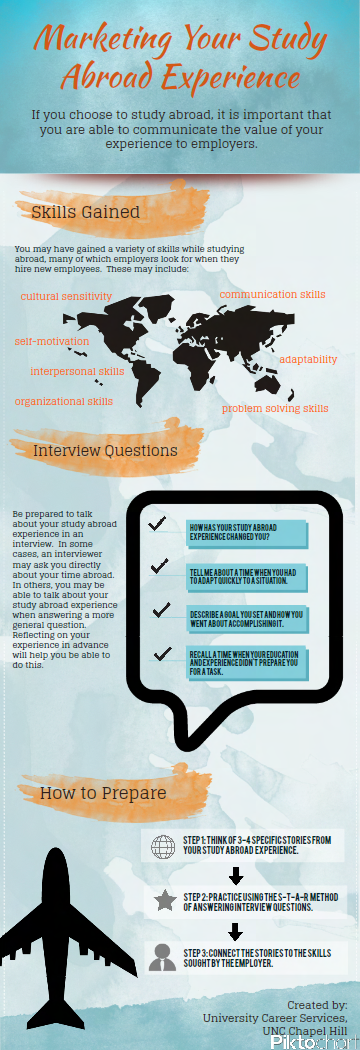Why Study Abroad?
Studying abroad is an immensely valuable experience. How valuable you may ask? Here are a few reasons!
- Get a competitive edge in applying to graduate school
- Form a broader and more sophisticated view of the world
- Increase your self-awareness, confidence, adaptability, and independence
- Gain a better understanding of cultural values and personal biases
- Improve your intercultural communication and language skills
- Start long-lasting friendships forged through shared experiences
- Have the adventure of a lifetime in an amazing destination
Studying abroad is an amazing personal experience that can also help you with your career path.
Studying abroad will give you a stronger resume, and improved job and internship prospects. You will gain hands-on field experience and broaden your professional network.
The financial cost of studying abroad can be overwhelming, but is well worth the investment. The infographic on the left outlines the many returns on investment that students gain from studying abroad, and how it affects their career paths. The infographic on the right will help you market your study abroad experience to potential employers.
MYTHS OF STUDY ABROAD
Myth #1: Studying abroad is too expensive
Reality: Kent State University offers more than 200 study abroad programs that range in costs. Some programs are very comparable to studying at Kent.
Some programs are more expensive and some are less. There are a variety of ways to pay for studying abroad, including scholarships, financial aid, and loans. By planning ahead, you can speak to your family about your financial restrictions, as well as save for your time abroad. If budgeting is a concern, the cost of a program can be factored into choosing the right program for you.
Myth #2: Financial aid doesn't transfer to study abroad.
Reality: Universities and colleges are required by federal law to continue to disburse funds to eligible students participating in approved programs. As in all regulations, there are some areas left open to interpretation, but the basic idea is that you should be able to use your federal aid.
Myth #3: It is necessary to speak a second language to study abroad.
Reality: While some programs do have a language requirement, many programs are taught exclusively in English.
ALL courses at Kent State University’s Florence program are taught in English except for Italian language courses.
Myth #4: It is not possible to complete major requirements while abroad.
Reality: Many students are able to earn credit toward their major while studying abroad. Regulations vary by major, college, and curriculum. Some Kent State University departments are stricter in their specific requirements but other departments offer some flexibility with their course work. With a large variety of programs, there may be one or several programs that provide courses that fulfill requirements in a specific major or curriculum.
Myth #5: Studying abroad will delay graduation.
Reality: Many students study abroad and graduate in four years. Students earn credit toward graduation requirements for most courses taken abroad. By frequently consulting and meeting with academic advisors, students can even study abroad for an entire academic year without affecting their graduation date. In fact, some students study abroad two or three times and still graduate on time.
Myth #6: Studying abroad doesn’t help your career.
Reality: Employers look to hire well-rounded employees who are able to demonstrate the ability to adapt well to new situations and thrive in multi-cultural environments.
Businesses are increasingly growing into international companies and utilizing skills gained from a study abroad experience gives potential employees an edge that others lack.



